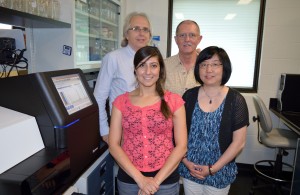Heparan sulfate proteoglycans are essential for human development. Many genes are involved in producing heparan sulfate and when these genes are mutated, they can lead to early-onset developmental disorders affecting multiple body systems. Our group identified a family with a disease designated as seizures-scoliosis-macrocephaly syndrome, which is characterized by seizures, intellectual disability, scoliosis, and prominent head enlargement. Using next-generation sequencing, a robust genetic diagnostic tool, we identified two mutations in a heparan sulfate synthesis gene, EXT2 in the patients. We used multiple approaches to assess the effect of these mutations on gene function and observed reduced EXT2 expression and activity. We have implicated a well-characterized gene in a new developmental disorder and have further illustrated the spectrum of phenotypes that can arise due to errors in heparan sulfate synthesis. (By Sali Farhan, http://jmg.bmj.com/content/early/2015/08/05/jmedgenet-2015-103279 )
Some of the authors (from left to right): Dr. Robert A. Hegele, John F. Robinson, Sali M.K. Farhan, and Dr. Jian Wang.
